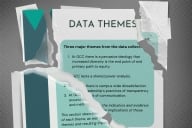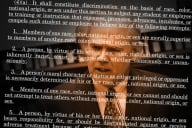You have /5 articles left.
Sign up for a free account or log in.
Geoffrey Miller has been called a jerk and a hypocrite. Now his excuse for the controversy that has brought him such criticism is being questioned as well.
Miller ignited a firestorm of outrage in June when he tweeted: "Dear obese PhD applicants: if you didn’t have the willpower to stop eating carbs, you won’t have the willpower to do a dissertation #truth."
After that fat-shaming tweet landed him in hot water, the evolutionary psychology professor claimed it was part of a research project. Reviews by two different universities have found that his tweet could not be considered “research” that would have required approval by an institutional review board.
The University of New Mexico, where Miller is a tenured professor, announced Monday that its Institutional Review Board determined Miller’s Twitter activities “did not rise to the level of ‘research’ much less ‘human-subject research’ as defined by federal regulations.” The IRB at New York University, where Miller is a visiting professor this summer, also opened an investigation. NYU also found that Miller’s alleged “research project” did not require approval from the university’s institutional review board, according to Bloomberg Businessweek.
“Miller, the school said, contended that approval was not required because it did not involve research on human subjects,” and the university agreed with him, says Bloomberg Businessweek.
Before making his account private, Miller deleted the original tweet and apologized on his account saying, his comment was “idiotic, impulsive, and badly judged.” He has not since tweeted from that account. The University of New Mexico psychology department chair, Jane Ellen Smith, released a video statement that same day and said Miller told her the comment was part of a research project, which prompted both UNM and NYU to conduct reviews.
“The committee determined that there were no clear research questions or hypotheses, systematic methods for collecting quantitative and/or qualitative data were absent, and that criteria for selecting respondents were unclear, at best,” said the University of New Mexico review board memo.
The finding is not good news for Miller in that, had he been doing research, his actions may well have been considered to be covered by academic freedom, and he may have even had a rationale for tweeting something that so many people found offensive. He could have been in trouble, however, if either university found that he conducted research involving human subjects without submitting a proposal to the appropriate review board.
The review has ended, but now Smith and her colleagues must decide if Miller will be disciplined. Smith said she will seek input from faculty as well as Miller himself and will make a recommendation to the dean about any consequences for Miller’s actions. She said the process will likely involve looking through the faculty handbook and could take weeks.
Miller did not immediately respond to a request for comment.
Miller’s tweet could have potential legal ramifications, since students who are disabled by their weight or are perceived to be are protected from discrimination by the Americans with Disabilities Act, said Sondra Solovay, a professor at San Francisco Law School and author of a book on weight-based discrimination.
“Here Geoffrey Miller has displayed prejudice and profound misconceptions about the causes of weight. This raises questions of discrimination related to students or employees that he supervised or had any influence over,” Solovay said in an e-mail. “The subsequent deception about there being a research purpose to the hurtful comment adds insult to injury.”
Following Miller’s tweet, some people raised concerns that Miller may have discriminated against past Ph.D. applicants, since he had served on an admissions committee. Smith said Miller served for only one year with a group of at least eight other faculty members. Not only are faculty members on the committee unaware of applicants’ weights, but it is unlikely that “one voice” could have had that much weight on an admissions decision.
Solovay said that while the University of New Mexico will need to worry about legal liability, the “reputation damage” Miller may have caused to the university could be of larger concern.
“The reputation damage affects the whole university,” Solovay said. “You want to feel like your professors are not acting from a place of bias. And if a faculty or staff member makes people question that, then that’s not an easy thing to get back.”








